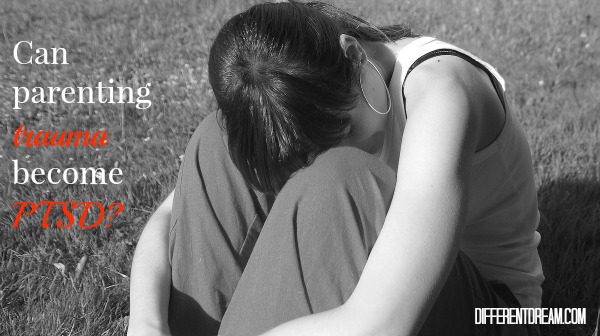Can Parenting Trauma Lead to PTSD? Pt. 3

Welcome to the third post in Different Dream’s series about special needs parenting stress, trauma, and PTSD. The first post introduced the series, while the second explained the difference between trauma and PTSD. Today, child psychologist Liz Matheis is back, this time with her answer to this question from the mom of a child who has PTSD: Can the stress of raising a child with PTSD result in a parent with PTSD? What other kinds of parenting trauma can lead to PTSD?
The answer to your question, “Can the stress of raising a child with PTSD result in a parent with PTSD?” is a resounding “Yes.” You, as a parent, are entering into the parenting scene with your own areas of strength and weakness. Sometimes they match up with your child’s needs, but sadly, sometimes they don’t. This can lead to feelings of helplessness and lack of control, which can be traumatizing and distressing. Let’s face it, when we become parents, there is no introductory period, trial period, or returns allowed. So even though we believed that parenthood should carry on in a particular way, it often does not. Then we have to grieve that loss of the family I hoped for or the parent I promised to be.
Parenting trauma can occur after any event or behavior that a parent finds overwhelming. For example: receiving a shocking diagnosis, being beaten by your child, feeling like you are the only person who can care for your child, having your child terminated from a preschool or private school program. There is no right or wrong way of becoming traumatized. Some people have a high tolerance for life’s surprise events, others are taken down right from the start, while others can take and take and take, but then become worn down.
Some examples of situations and events that can lead to parent PTSD are on-going stresses such as marital conflict, frequent hospitalizations for your child, frequent trips to the ER, having a child who was in the NICU or PICU, aggressive behavior issues (e.g., head banging, biting, punching, pinching, spitting). Other situations include difficulties in finding the right physician or therapist to provide the support your child needs (sensory-wise, medication, overall health) or difficulty in finding a school for your child where staff uses a humane approach to handle him.
Parent PTSD can also be activated when distressing experiences in raising your child that are being triggered by trauma you may have experienced as a child, adolescent or young adult. That is, pre-existing trauma that is re-triggered by the stress of parenting a child with special needs. Pre-existing traumas could include child abuse, emotional abuse, neglect, significant hospitalization or illness, rape, or even childbirth.
Although the symptoms of PTSD are often the same for parents and child, the triggers can be different. Your child with PTSD may have nightmares, flashbacks, numbness, and avoidance behaviors triggered by certain odors, scents, places, or faces. For parents the PTSD flashbacks and nightmares can spring from inability to control or manage the child’s aggressive behavior, nightmares, and other extreme emotions that accompany their fears. The stress of parenting a child with PTSD also means that both you and your child are regularly in fight mode for different reasons. So, you both may be sleep deprived yet hypervigilant, watching for triggers or potential dangers.
Your Questions about Parenting Trauma and PTSD
Do you have questions about parenting trauma, stress, and PTSD? If so, you’re invited to leave them in the comment box for Dr. Liz.
Do you like what you see at DifferentDream.com? You can receive more great content by subscribing to the quarterly Different Dream newsletter and signing up for the daily RSS feed delivered to your email inbox. You can sign up for the first in the pop up box and the second at the bottom of this page.

By Liz Matheis
Dr. Liz Matheis is a clinical psychologist and school psychologist in Parsippany, NJ. She offers support, assessments, and advocacy for children who are managing Autism Spectrum Disorders, ADHD, learning disabilities, and behavioral difficulties, as well as their families. She is also a contributor to several popular magazines. Visit www.psychedconsult.com for more information.
1 Comment
Submit a Comment
Subscribe for Updates from Jolene
Related Posts
How Do I Let Go of My Adult EA/TEF Child?
Valeria Conshafter explores the question “How do I let go of my adult EA/TEF child?” for EA/TEF Awareness Month.
The Physical Manifestations of Grief in Caregivers
Jolene explains how the heaviness of loss and sorrow can contribute to the physical manifestations of grief in caregivers.
Experiencing Post-Traumatic Growth while Raising a Child with Disabilities
Jolene explains the benefits of experiencing post-traumatic growth while raising a child with disabilities.






Thanks for sharing this very informative and important info at Faith. Hope, and Love! I’ll bet there are many parents who have PTSD and do not even realize it!